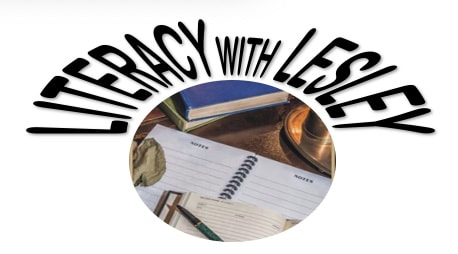ABOUT ME/ABOUT THE SITE
Hi, Lesley Roessing Here
I was a public school teacher in eastern Pennsylvania for 20 years. I taught high school grades 9-12 (2 years). For the next 18 years I taught middle school English/Language Arts, Humanities, and Gifted Studies.
In 2009 I was invited to serve as the Founding Director of the Coastal Savannah Writing Project at Georgia Southern University (formerly Armstrong State University) where I taught in the College of Education, teaching pre-service and in-service teachers. I worked with K-12 educators from Georgia, South Carolina, and other areas of the country in Weekend Workshops and Summer Reading and Writing Institutes. In that capacity, I was invited to schools to present in-service and to facilitate lessons and book clubs in classrooms at all levels. The year prior to my retirement, I served as the Literacy Consultant (Coach) for a K-8 charter school.
I am the author of 5 professional books for educators and have contributed chapters to 4 other professional books [see My Publications Page] and have written for a variety of professional publications, as well as serving as a past editor for the Georgia Council of Teachers of English (GCTE) Connections and as a columnist for AMLE Magazine. I have written guest blogs for Dr. Bickmore's YA Wednesday, Russ on Reading, and A Novel Mind. I have presented at numerous national and international conferences on various aspects of literacy.
I now work independently—writing, providing professional development in literacy (in-person and virtually), and visiting classrooms to facilitate reading and writing lessons, as well as posting literacy strategies, lessons, and book reviews for educators on my Facebook and, through this website.
I was a public school teacher in eastern Pennsylvania for 20 years. I taught high school grades 9-12 (2 years). For the next 18 years I taught middle school English/Language Arts, Humanities, and Gifted Studies.
In 2009 I was invited to serve as the Founding Director of the Coastal Savannah Writing Project at Georgia Southern University (formerly Armstrong State University) where I taught in the College of Education, teaching pre-service and in-service teachers. I worked with K-12 educators from Georgia, South Carolina, and other areas of the country in Weekend Workshops and Summer Reading and Writing Institutes. In that capacity, I was invited to schools to present in-service and to facilitate lessons and book clubs in classrooms at all levels. The year prior to my retirement, I served as the Literacy Consultant (Coach) for a K-8 charter school.
I am the author of 5 professional books for educators and have contributed chapters to 4 other professional books [see My Publications Page] and have written for a variety of professional publications, as well as serving as a past editor for the Georgia Council of Teachers of English (GCTE) Connections and as a columnist for AMLE Magazine. I have written guest blogs for Dr. Bickmore's YA Wednesday, Russ on Reading, and A Novel Mind. I have presented at numerous national and international conferences on various aspects of literacy.
I now work independently—writing, providing professional development in literacy (in-person and virtually), and visiting classrooms to facilitate reading and writing lessons, as well as posting literacy strategies, lessons, and book reviews for educators on my Facebook and, through this website.
TABLE OF CONTENTS (to date)
MY PUBLICATIONS
Information on my professional books on reading, writing, grammar, and projects to build classroom community
1. The Write to Read: Response Journals That Increase Comprehension
2. No More “Us” and “Them”: Classroom Lessons & Activities to Promote Peer Respect
3. Talking Texts: A Teacher's Guide to Book Clubs across the Curriculum
4. Bridging the Gap: Reading Critically & Writing Meaningfully to Get to the Core
5. Comma Quest: The Rules They Followed—The Sentences They Saved
BLOGS
1. Teaching through the Gradual Release of Responsibility Model
2. Choosing Books for Book Club Reading
3. The Importance of Reader Response
4. The Benefits of After-Reading Response
5. The 5 Steps to Facilitating Book Clubs
6. Memoir: Writing about What Matters
7. The Steps & Strategies of Teaching a Writing
8. Building Community & Learning through Collaboration
BOOK REVIEWS (drop-down menu)
1. Planning a Diverse Library
2. Surviving Loss & Abandonment
3. Historical Fiction
4. Sports Fiction
5. Teen Justice & Change Seekers
6. Mental Health & Neurodiversities
7. Latinx & Hispanic Characters & Authors
8. Bullying
9. Acts of Kindness
10. STEM Novels
11. Identity & Self-Discovery
12. Winter Holidays
13. Contending with the Law
14. Family Relationships
15. Stories of Black History
16. Read Across America
17. Verse Novels
18. Immigrant/Refugee Experience
19. Strong Resilient Girls in Literature
20. Asian, Asian-American, and Pacific Islander Authors/Characters
21. Novels featuring Contemporary Jewish Characters
22. Multiple Voices & Multiple Perspectives
23. Short Readings: Stories, Essays & Memoirs
24. Graphic Novels
25. Characters Facing Physical Challenges & Illness
26. Characters Who Are Adopted or in Foster Care
27. Love and Friendship
28. Memoirs (coming soon)
STRATEGY SHORTS (drop-down menu)
• READING STRATEGIES
1. K-W-H-L-R Chart
2. The Book Pass
3. Pre-Reading Free-Write Objects Activity
4. Book Talk Guidelines
5. Genre Record Chart to Encourage Wide Reading
6. Teaching Reading Strategies & Literary Elements through Short Stories
7. Student Book Reviews to Share Reading
8. A Sample Reading Workshop Focus Lesson: Making Predictions
9. "Teaching" the Whole-Class Novel
10.Teaching Discussion Strategies
11. Notepassing as a Discussion Strategy
12. Inter-Book Club Meetings
13. Another Reading Workshop Focus Lesson: Setting a Purpose
14. Text Sets for Reading Informative Texts
15. Encouraging Diverse Reading
16. Readers' Theater: Reading, Writing, Speaking
17. Summer Reading Ideas
18. Teacher Read-Alouds
19. Reading Journals
20. Author-Study Book Clubs
• WRITING STRATEGIES
1. Free Writing for Fluency
2. Introducing Argument Writing
3. Using Transition Words & Phrases
4. Writing a Collaborative Story
5. The Class "We Are" Poem
6. Informative Writing: Pre-writing Steps & Strategies
7. Informative Writing: Draft to Publication & Assessment
8. Writing through the Year: Units of Study
9. Teaching Voice in Writing
10. Peer Review for Revising a Writing
11. A Getting-To-Know-You "Writing" Activity
12. Writing for an Authentic Audience
13. Brainstorming Settings for Narrative Writing
14. A Collaborative Project with Narrative, Informative, and Persuasive Writing
15. The Six Traits of Writing
16. The Basic Elements of Argument Writing, explained
17. Audience Awareness for Argumentation
18. Formatting Informative Writing: A-B-C Books
19. Assessing Writing with Domain/Trait Rubrics
20.Collaborative Informational Writing: The Novel/Text Newspaper
21.Writing Fables
22. Sentence Fluency: Building Better Sentences
23.Leads - A Writing Workshop Lesson
• PUBLIC SPEAKING & DEBATE STRATEGIES
1. Choral Reading Techniques
2. Debate: A Speaking, Research, & Argument Writing Strategy
3. Speech Guidelines
4. Chart for Student/Listener Analysis
• POETRY STRATEGIES
1. Teaching Poetic Forms through Verse Novels
2. Learning Content through Writing Poetry
3. Creating Haiku Calendars
4. Teaching Odes
5. A Free-Verse Poetry Lesson
6. Limericks to Teach Rhyme Scheme and Rhythm
7. Poetry as Mentor Texts for Writing
8. List Poetry
9. I Am Poetry for Building Classroom Community
10. Teaching End Rhyme and Internal Rhyme
11. I AM Poetry to Analyze Characters and Increase Comprehension
12. Poetry Lesson for Reading & Writing a Memoir of Time
13. Poetry in Two Voices to Compare & Contrast
14. Using FOUND POETRY to determine important details and synthesize reading
• VOCABULARY STRATEGIES
1. Teaching Roots & Affixes
2. Creating Logos to Learn Words
3. Vocabulary for Standardized Test Prep
4. Vocabulary Personification to Learn Words in New Ways
5. Wordplay
6. Word Walls
7. Reviewing Vocabulary through Writing Raps & Rhymes
8. Creating Ads
9. Creating Limericks to Review Vocabulary
* RESEARCH & PROJECT STRATEGIES
1. Scaffolding Teaching Citations
2. Research That Is Purposeful
3. An Interactive Collaborative Interdisciplinary Action-Research Project
4. Teaching about URLs
5. Elements of Effective & Collaborative Projects
6. Holocaust Research & Book-Writing Project
7. The Cinderella Cultural Diversity Project
8. Researching and Writing a (School) Community Book
9. Writing a Collaborative Story: A (Visual) Reading-Writing-Speaking Activity
10. Interdisciplinary Folktale Projects
11. Ways to Make Research Matter
12. Collaborative Informational Writing: The Novel/Text Newspaper Project
13. Creating Original Picture Book from Reserach

